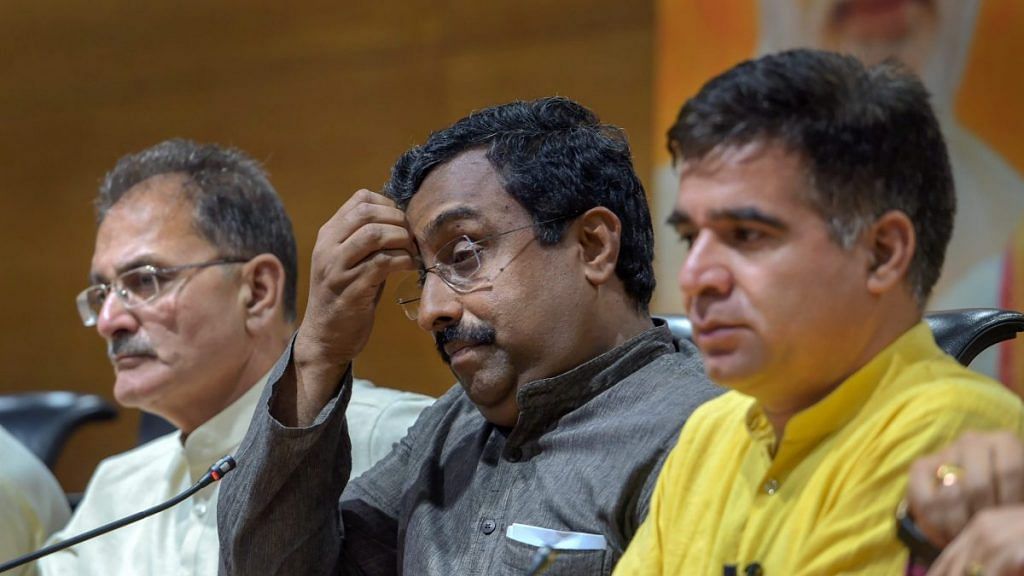More than five months after Parliament voted to scrap the special status of Jammu and Kashmir to “fully integrate” the erstwhile state with India, even the people in Jammu are voicing their open displeasure. There is little to show that the purpose of diluting Article 370 has been achieved or is anywhere near being achieved.
The BJP-supporting, Hindu majority population of Jammu has always resented the Kashmiri dominance in matters of development, jobs, and politics. But now, it has started questioning, albeit in hushed voices, the rationale behind the Modi government’s August 2019 move.
What the controversial decision has achieved is merely internationalise the somewhat dormant Kashmir issue once again. In the process, Narendra Modi-led BJP has adopted several hard measures – snap the phone and internet lines, put scores of mainstream politicians under house arrest, and heighten the distrust among common J&K citizens.
Also read: ‘Dictatorship’, no ‘accountability’, no jobs: People in Jammu say Modi govt has failed them
Jammu is unhappy
More than Kashmir, which is always in the cross-hairs of the BJP’s electoral strategy, it is Jammu that has started to feel cheated – even after supporting the decision to split the former state into two Union Territories.
“Sabak un (Kashmiris) ko sikhana tha ya humko? (Wasn’t the decision meant to teach a lesson to Kashmiris? Then why are we suffering?),” is a question being asked more often these days on the streets of Jammu.
While the dominant understanding is that Kashmiris have been without communication channels since the dilution of Article 370, what many outside J&K ignore is that Jammu too doesn’t have mobile internet. The region is now feeling slighted. Privately, even senior BJP leaders admit that the Article 370 move may have backfired in the absence of a clear gameplan.
Also read: New political front takes shape in Kashmir, and it’s ready to look beyond Article 370
The job scenario
Employment opportunities, or the lack of adequate share in government jobs, was always a big sore point with the electorate in Jammu, and they viewed the politically-dominant Kashmir taking away the major chunk of jobs. The Jammu and Kashmir High Court’s withdrawal of its recent notification inviting non-J&K residents to apply for district court jobs just goes to show how charged the job scenario in Jammu is.
The Jammu region, which is mostly hills barring parts of Jammu, Samba and Kathua districts, has little land to set up big factories. This is one reason why, despite a slew of incentives announced over two decades ago by Atal Bihari Vajpayee-led NDA government for hill states, Jammu and Kashmir attracted very little economic activity. On top of that, outsiders couldn’t buy land in J&K.
After the Article 370 move’s initial hoopla fizzled out, the local people realised that grand announcements by BJP leaders and union ministers notwithstanding, big companies weren’t exactly making a beeline to invest in Jammu and Kashmir.
This, many now say, was the main reason behind the postponement of the Jammu and Kashmir Investor Summit, which was scheduled for October 2019.
The officials, left red-faced, had argued at the time that the government needed time to make more arrangements and also wait for the law and order situation to improve. But the reality is this is now the subject on the street and in drawing room conversations.
Also read: RSS-BJP’s new plan for Kashmir — prop up Maharaja Hari Singh as a nationalist
Are we also anti-national now?
A bitter Jammu has begun to ask questions, something that the local BJP leadership is also waking up to now.
With access to mobile internet restricted, Jammu sees a clear parity with the Kashmir region. This is now leading to questions like why the Narendra Modi government can’t trust them. “Are we also anti-national now?” they frequently ask these days.
They have already started wondering if celebrations over the revocation of special status were premature. Many are of the view that while Kashmir may have been slighted, Jammu too has gained nothing.
Also read: J&K Police vehicle crushes 16-year-old to death, clashes break out in Srinagar’s Nowgam
Back to earlier days
Property prices haven’t exactly gone up as people had thought they would. Clampdown on political activity continues in the Jammu region as well. Outsiders can’t yet buy land. There is no uptick in economic activity. So what has changed?
Nothing.
In place of corrupt or inefficient ministers in the previous government, the Union Territory now has a Lieutenant-Governor who is assisted in administrative decision-making by advisors. Despite some vastly publicised public outreach events, the Modi government remains elusive to the common people. And, this is making Jammu angry, forcing people to assess the pros and cons of the 5 August 2019 move.
For the BJP, these are ominous signs. Unless the narrative changes, which is possible only through concrete steps on the ground, the party could lose its bastion of Jammu.
The author is a senior journalist. Views are personal.
